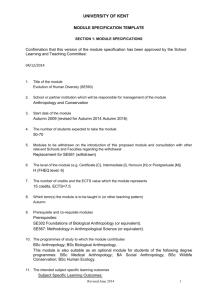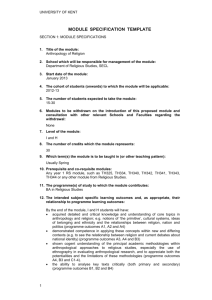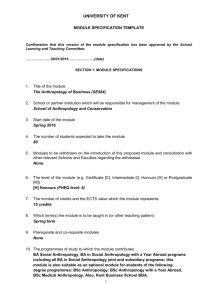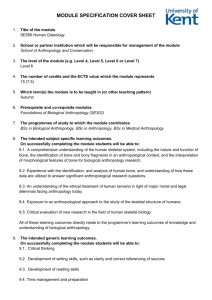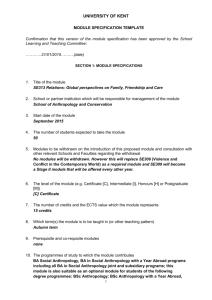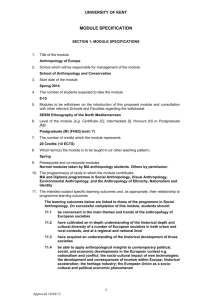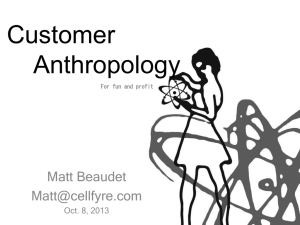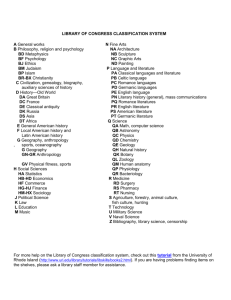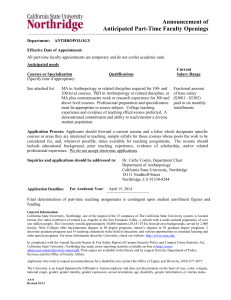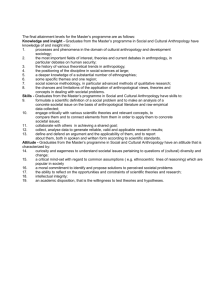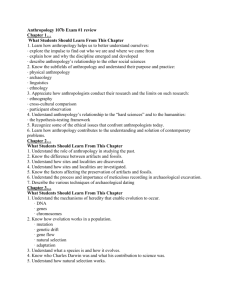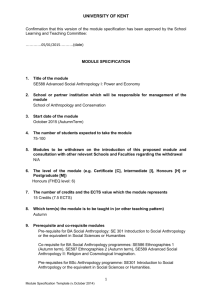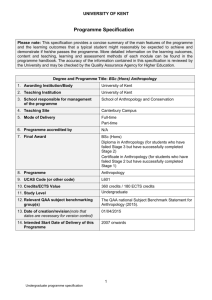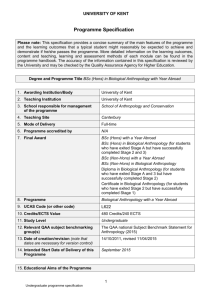University of Kent
advertisement
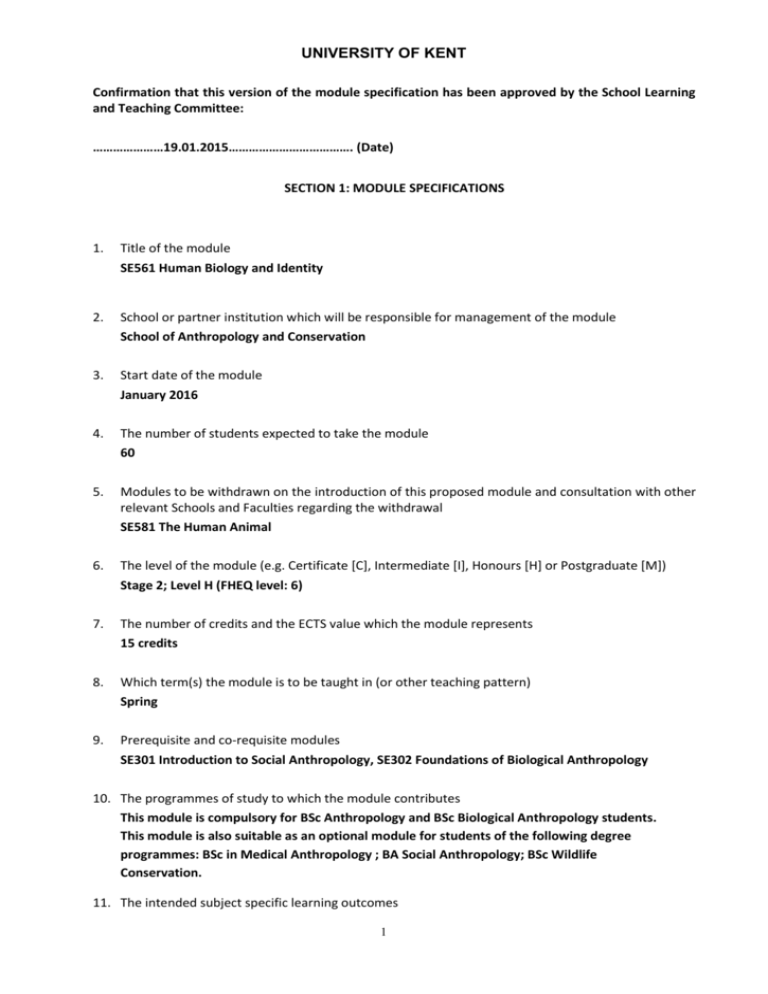
UNIVERSITY OF KENT Confirmation that this version of the module specification has been approved by the School Learning and Teaching Committee: …………………19.01.2015………………………………. (Date) SECTION 1: MODULE SPECIFICATIONS 1. Title of the module SE561 Human Biology and Identity 2. School or partner institution which will be responsible for management of the module School of Anthropology and Conservation 3. Start date of the module January 2016 4. The number of students expected to take the module 60 5. Modules to be withdrawn on the introduction of this proposed module and consultation with other relevant Schools and Faculties regarding the withdrawal SE581 The Human Animal 6. The level of the module (e.g. Certificate [C], Intermediate [I], Honours [H] or Postgraduate [M]) Stage 2; Level H (FHEQ level: 6) 7. The number of credits and the ECTS value which the module represents 15 credits 8. Which term(s) the module is to be taught in (or other teaching pattern) Spring 9. Prerequisite and co-requisite modules SE301 Introduction to Social Anthropology, SE302 Foundations of Biological Anthropology 10. The programmes of study to which the module contributes This module is compulsory for BSc Anthropology and BSc Biological Anthropology students. This module is also suitable as an optional module for students of the following degree programmes: BSc in Medical Anthropology ; BA Social Anthropology; BSc Wildlife Conservation. 11. The intended subject specific learning outcomes 1 UNIVERSITY OF KENT On successful completion of the module students completing the module should be able to: 11.1 Demonstrate advanced knowledge of principles of biological anthropology, specifically relating to human evolution, the fossil record, adaptation and ecology. 11.2 Clearly understand the relationships between biology and life processes specifically in relation to human evolution and analyse the interplay between human biology, life history processes and human behaviour 11.3 Critically discuss biological models and adaptive strategies to understand ‘what makes us human?’ 11.4 Understand causal and interpretative ideas about life processes and history in different cultures and the ways in which human identities are socially processed in different cultures 11.5 Understand how changes in environment and diet contributed to human evolution 12. The intended generic learning outcomes: On successful completion of the module students completing the module should have: 12.1 Developed highly transferable critical reasoning and evaluation skills. (e.g. identify aspects of the module which are applicable to other areas of anthropology, specifically those which can aid understanding of other modules, i.e. the evolution of human life history in comparison to nonhuman great apes) 12.2 Developed advanced communication skills (e.g. writing skills, including clarity and appropriate referencing of sources, and reading skills and oral presentation skills, via a portfolio of written coursework) 12.3 Experience in time management and preparation 12.4 The ability and knowledge to organise information in a clear way (e.g development of independent study skills and interpersonal skills via critically debating topics with peers) 12.5 Increased their knowledge of, and developed their, practical anthropological skills (e.g. practical lab skills relating to the quantification and comparative analysis of metric data) 13. A synopsis of the curriculum The module is designed as a bridging module between more biological elements of the BSc programme and the more socio-cultural anthropology courses students take as part of that programme. Being largely a broad survey of human evolutionary biology and identity, it will serve to introduce the more biological students to arguments and materials that will place their biological understanding within a broader framework of ideas about what makes people who and what they are and encourage them to explore the socio-cultural aspects of biological science. For the more socio-cultural BA students the module provides an opportunity to consolidate biological understanding from the Foundations of Biological Anthropology module and learn how to assess the assumptions and limitations of biology in the understanding of human behaviour. We will cover topics such as the human fossil record, human variation, what makes us human and ecological adaptation. By the end of the module the student should have knowledge of the basic principles of biological anthropology, an understanding of human identity, and be able to relate those ideas to wider concepts in biology. The student will be given an overview of the hominin fossil record and its interpretation, and receive in depth study of the different biological and social aspects that define us as human and the evolution of human life histories. The student will be introduced to the genetic and phenotypic variation of the modern human species, how humans have adapted to particular environments, and the importance diet played in human evolution. The student will also acquire some of the practical skills of data collection currently used by biological anthropologists. 2 UNIVERSITY OF KENT 14. Indicative Reading List 1. Cartmill, M., and Smith, F.H. (2009). The Human Lineage. Hoboken, NJ: Wiley-Blackwell 2. Conroy, G.C., and Pontzer, H. (2012). Reconstructing Human Origins: A Modern Synthesis. New York: W.W. Norton. (3rd edition) 3. Klein R.G. (2009). The Human Career: Human Biological and Cultural Origins. Chicago: University of Chicago Press. (3rd edition) 4. Lewin, R., and Foley, R. (2004). Principles of Human Evolution. Malden, Mass.: Blackwell Publishing. (2nd edition) 5. Mielke, J.H., Konigsberg, L.W., and Relethford, J.H. (2011). Human Biological Variation. Oxford University Press. (2nd edition) 6. Wood, B. (2005). Human Evolution: A Very Short Introduction. Oxford University Press 7. Hublin, J. J., & Richards, M. P. (2009). The Evolution of Hominin Diets. In Integrating Approaches to the Study of Palaeolithic Subsistence. Springer Berlin. 15. Learning and Teaching Methods, including the nature and number of contact hours and the total study hours which will be expected of students, and how these relate to achievement of the intended module learning outcomes The module is based on 24 contact hours balanced between lectures, laboratory practicals and seminars. There will be 1 hour lectures per week (12x1), 1x2 hour laboratory practical per module, 1x2 hour seminar and 8x1 hour seminars per module. A reading week will also be included to allow students additional time for independent learning including assimilation of lecture material, additional reading, assignment completion and revision for examination. The non-contact hours will provide time for independent study by students (56 hours), and sufficient seminar (20 hours) and assignment preparation (50 hours). The lectures provide the intellectual framework for the course, presenting the central arguments and materials on, evolution, ideology and identity, and suggesting ways in which these arguments can be followed up in the relevant literature. Some of the lectures are topically separated but given the linked nature of human biology and identity the lectures are largely cumulative, so a complete understanding of the module depends on full attendance. The lectures are intended to stimulate the student’s own reading and sense of enquiry. The laboratory practical primarily allows students to get hands-on experience; the practical will test the students’ knowledge and practical skills in relation to how various aspects of environment and diet shaped evolution and identity. Successful completion of the module requires attendance of the practical. The 2 hour seminar will form preparation for completion of the essay assignment. Successful completion of the module requires attendance at this seminar. The 1 hour seminars are a mixture of open discussions, structured debates and short presentations by students individually and in groups. Each seminar either works through a set of empirical materials in terms of the arguments of the related lecture(s) or examines in detail specific central texts. The focus is involvement with and development of academic argument with an emphasis on evidence and the detection of assumptions both in student presentations and texts written by academics. TOTAL HOURS: 150 Achievement of module learning outcomes: Lectures will address learning outcomes 11.1 – 11.5 and 12.1, 12.4 Seminars will address learning outcomes 11.1 – 11.5 and 12.1 – 12.4 Laboratory practicals will address learning outcomes 11.2, 11.4 and 12.2, 12.4-12.5 3 UNIVERSITY OF KENT 16. List each applicable assessment method and their weighting and indicate which module learning outcomes (both section 11 specific and section 12 generic) are addressed by that assessment method, as above. Assessment will be 50% unseen examination (2 hours) and 50% coursework. The coursework consists of a written laboratory report (worth 25%) [11.1, 11.5, 12.5], an essay on a topic of the students’ choosing related to an aspect of identity interesting to them (20%) and a journal review assignment (5%). [11.1, 11.2, 11.3, 12.1, 12.2, 12.4, 12.5]. The coursework and the exam provide assessment which rewards scholarly research [12.1, 12.2, 12.5], critical thinking [12.1, 12.3.] and good written skills [12.2, 12.5]. In addition, the unseen examination also tests the student’s ability to retain and accumulate knowledge [11.1-11.5]. 17. Implications for learning resources, including staff, library, IT and space Existing Library and IT resources are adequate for this module. Additional laboratory resources will be required for completion of laboratory practicals (e.g. updated plastic anatomical skeletons in the laboratory, etc…) 18. The School recognises and has embedded the expectations of current disability equality legislation, and supports students with a declared disability or special educational need in its teaching. Within this module we will make reasonable adjustments wherever necessary, including additional or substitute materials, teaching modes or assessment methods for students who have declared and discussed their learning support needs. Arrangements for students with declared disabilities will be made on an individual basis, in consultation with the University’s/Collaborative Partner’s (delete as applicable) disability/dyslexia support service, and specialist support will be provided where needed. 19. Campus(es) where module will be delivered: Canterbury 4 UNIVERSITY OF KENT SECTION 2: MODULE IS PART OF A PROGRAMME OF STUDY IN A UNIVERSITY SCHOOL Statement by the School Director of Learning and Teaching/School Director of Graduate Studies (as appropriate): "I confirm I have been consulted on the above module proposal and have given advice on the correct procedures and required content of module proposals" ......................................... ....30/01/2015........................ Director of Learning and Teaching Date …Tatyana Humle… Print Name Statement by the Head of School: "I confirm that the School has approved the introduction of the module and, where the module is proposed by School staff, will be responsible for its resourcing" . ................................................................ 30/01/2015.................................. Date Head of School Prof. Joao de Pina-Cabral. Print Name SECTION 3: MODULE IS PART OF A PROGRAMME IN A PARTNER COLLEGE OR VALIDATED INSTITUTION (Where the module is proposed by a Partner College/Validated Institution) Statement by the Nominated Officer of the College/Validated Institution (delete as applicable): "I confirm that the College/Validated Institution (delete as applicable) has approved the introduction of the module and will be responsible for its resourcing" ................................................................. .............................................. Nominated Responsible Officer of Partner College/Validated Institution Date …………………………………………………. Print Name 5 UNIVERSITY OF KENT ………………………………………………….. Post …………………………………………. Partner College/Validated Institution Module Specification Template Last updated July 2014 6
